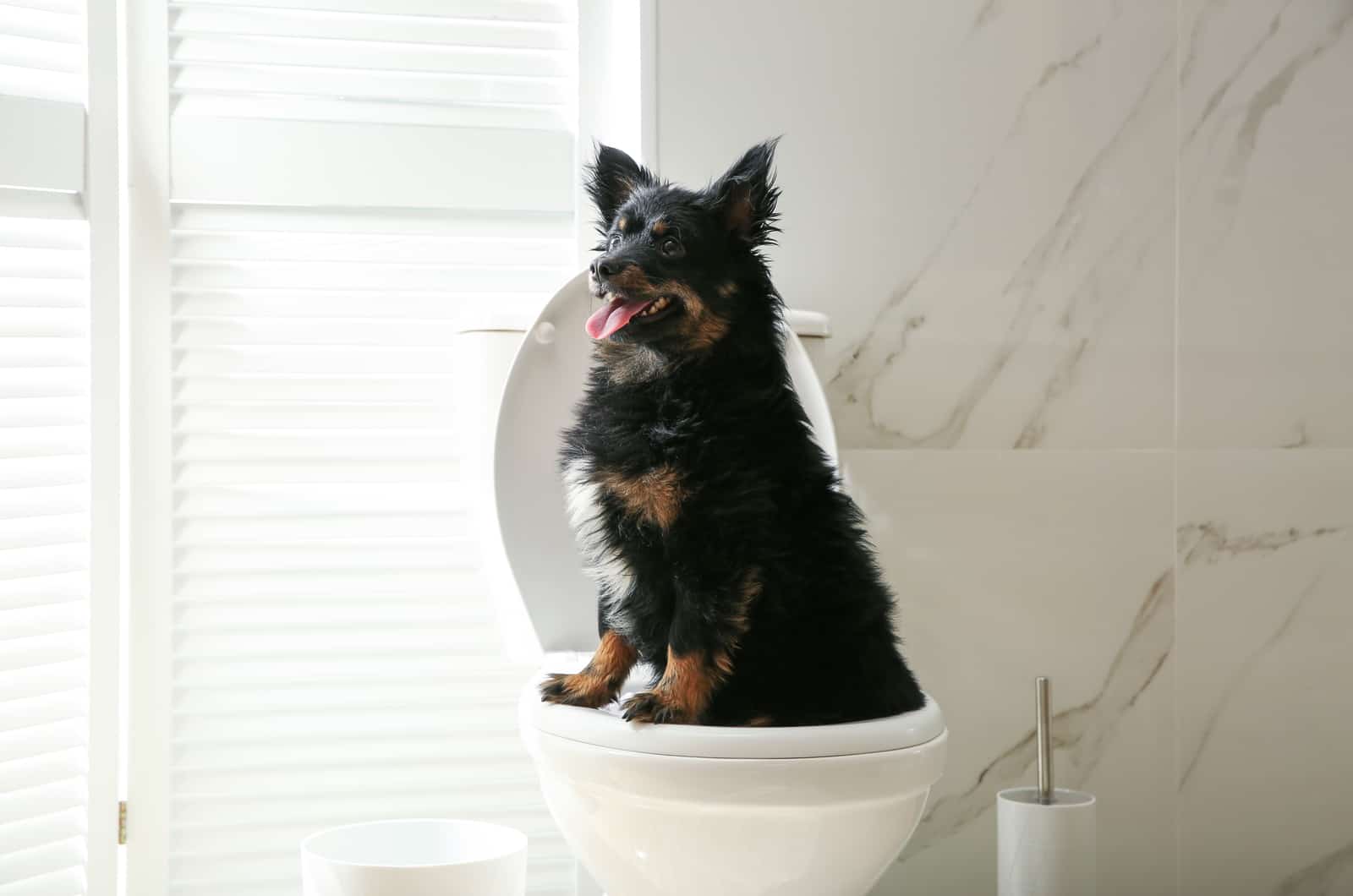Were you the one to yell: “My dog is 6 months old and not potty trained, help”? Nice to meet you… we’re here to help. There’s no need to be afraid of housebreaking your dog. Sure, every first-time owner is a bit afraid of whether he’ll handle his new dog correctly. Housebreaking or dog training to go potty is a big deal.
If your new puppy just peed on your floor, we’re sorry to inform you that this is a bad sign. Potty training should start as soon as possible, when they’re only 5- or 6-week-old pups. A trained dog would never pee on the carpet, no matter if it’s a trained puppy, an adult dog, or an old dog.
It’s up to you to guide the puppy through the potty training process, and do your best for the both of you to succeed. With lots of positive reinforcement, your small dog will soon become fully potty trained. But first, let’s see why you would say: “My dog is 6 months old and not potty trained”. Does potty training develop in stages?
5 Potty Training Skills By Age
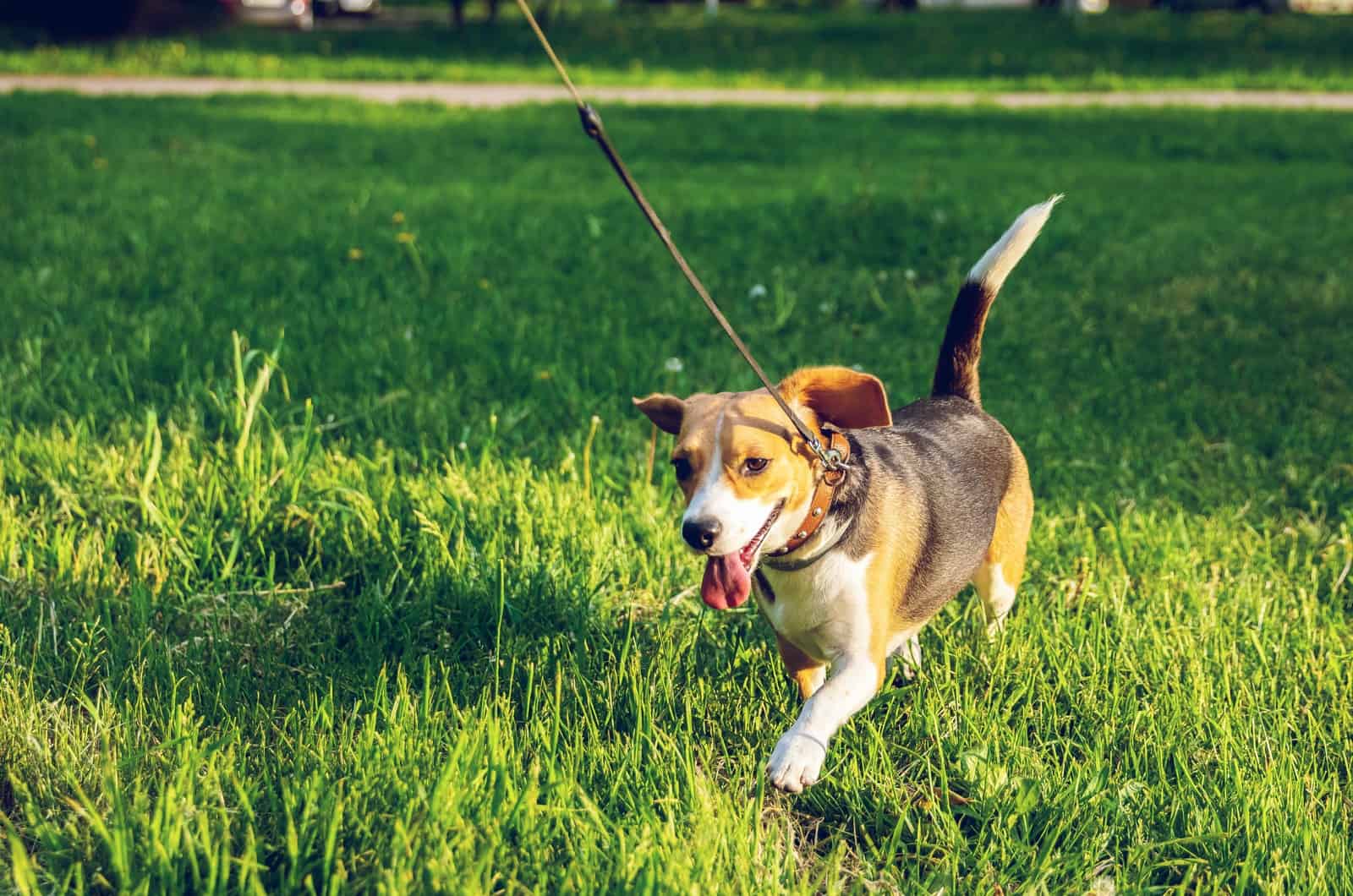
As your little rascal becomes bigger, its bladder muscles develop, and potty training skills become easier to adopt. Expecting your puppy to be fully potty trained by the age of 6 months is a bit too much. You need to give your dog some time and work with him before this happens. There’s no such thing as success overnight or a magic wand.
To help you understand potty capabilities better, we’ve gathered a little overview of potty readiness by each month.
As four-month-old puppies, they’re still prone to some accidents. No matter how hard you try and work with your puppy, accidents will happen. Even with the strictest house training plan, your pup’s bladder is not fully developed yet, and it’s still quite small.
In approximately a month, your puppy should experience fewer accidents. Accidents usually happen when the playtime is too interesting to take a potty break or if they’re left alone for too long. Bladder muscles are still not there yet, but they’re getting better.
Most puppies develop their bladder muscles around 6 months of age. You should notice that accidents are not as frequent anymore. However, even though their bladder muscles are developed, the puppy’s behavior and training skills still need some tweaking.
Seven-month-old puppies have the training skills and the physical ability to hold their bladder for longer periods. Accidents should not happen, but if they do, you should check your potty training program for faults.
Around their first birthday, puppies should be potty trained. For a one-year-old puppy, having bladder accidents is quite uncommon. In case your pup does make a mess sometimes, you should consult your vet to determine where the problem lies: is it a behavioral issue or something regarding the dog’s health?
6 Things You Need To Avoid When House Training
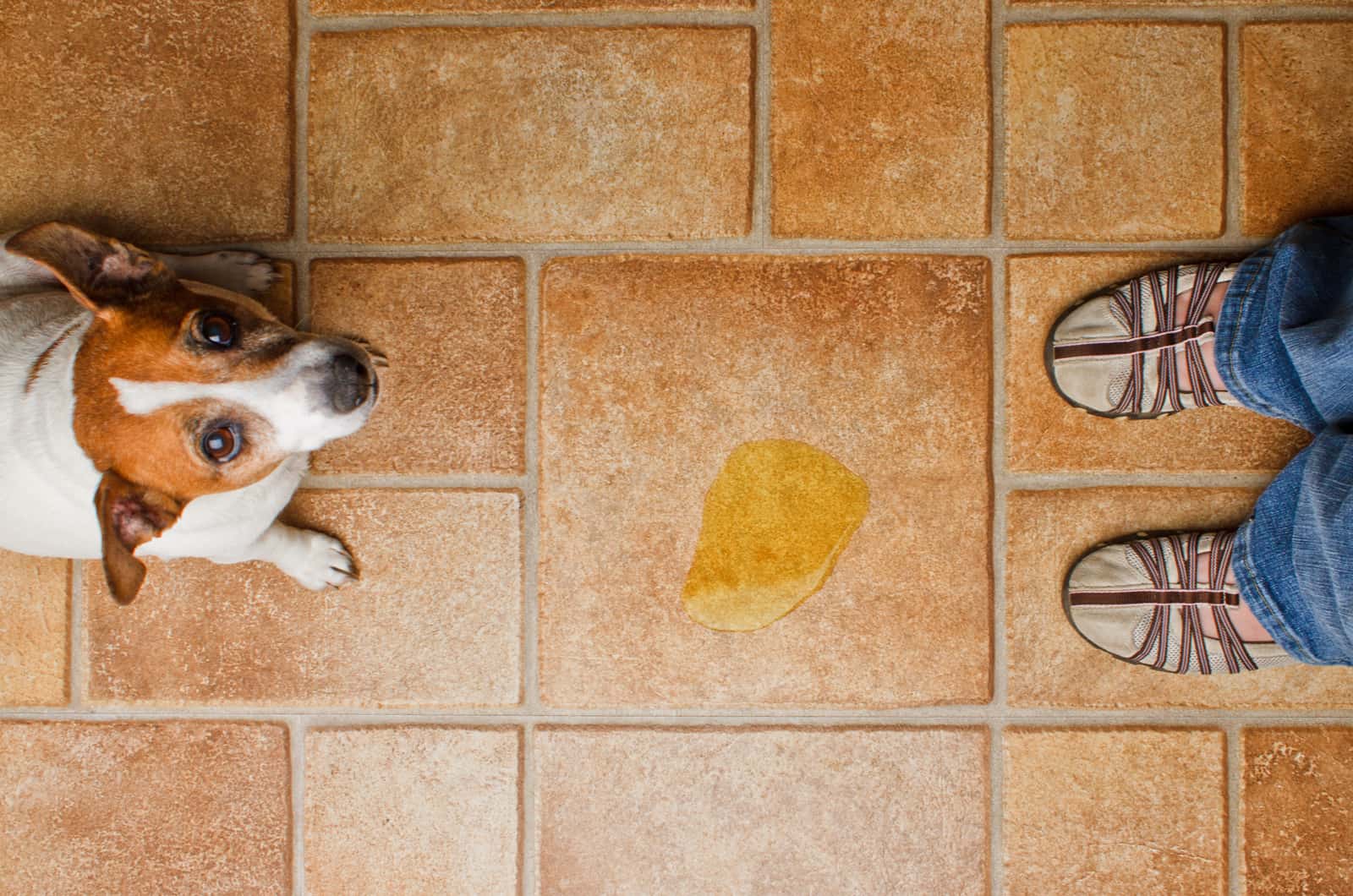
1. No puppy pads. Even though potty pads are helpful, avoid laying them out during the house-training process. This will make your puppy think that peeing and pooping on the floor is alright. If you let it go too far, that spot may become a lifelong potty spot for your dog. No matter how helpful they seem to be, wee wee pads are strictly off limits!
2. No punishing accidents. Although instincts may tell you to punish bad behavior and accidents, you should not do that. Your puppy will begin to fear you, and fear is the biggest reason for accidents.
3. Insufficient cleaning. Please use an enzymatic cleaner to remove any pee odor efficiently.
4. Not giving a treat. Dogs love food so much that they seem to be hungry all the time. They love treats even more. When going through any training, especially potty training, give your puppy lots and lots of praise and treats for a job well done!
5. Not keeping limits. Puppies should have limited access to all parts of the house all the time, especially during house training. Keep an eye on them to prevent big accidents. So, yeah, no sleeping between your legs!
6. Not getting them checked. If house training isn’t going the way it’s supposed to, then maybe it’s a problem with your dog’s health. A medical issue can be a big reason why a puppy is having trouble with potty training.
What Stops Potty Training From Being Successful?
Usually, when potty training doesn’t go the way it’s supposed to, it’s because of these reasons:
• The potty training doesn’t suit your dog
• History of problems is making potty training difficult
• A medical issue prevents the dog from being potty trained
What you should do is visit your vet to exclude some medical problems before you go further with the potty training. For example, painful UTIs are often a cause as to why the training isn’t successful.
When you rule out medical issues, and everything turns out to be okay, you can go see a professional dog trainer.
A Word About Urinary Tract Infections
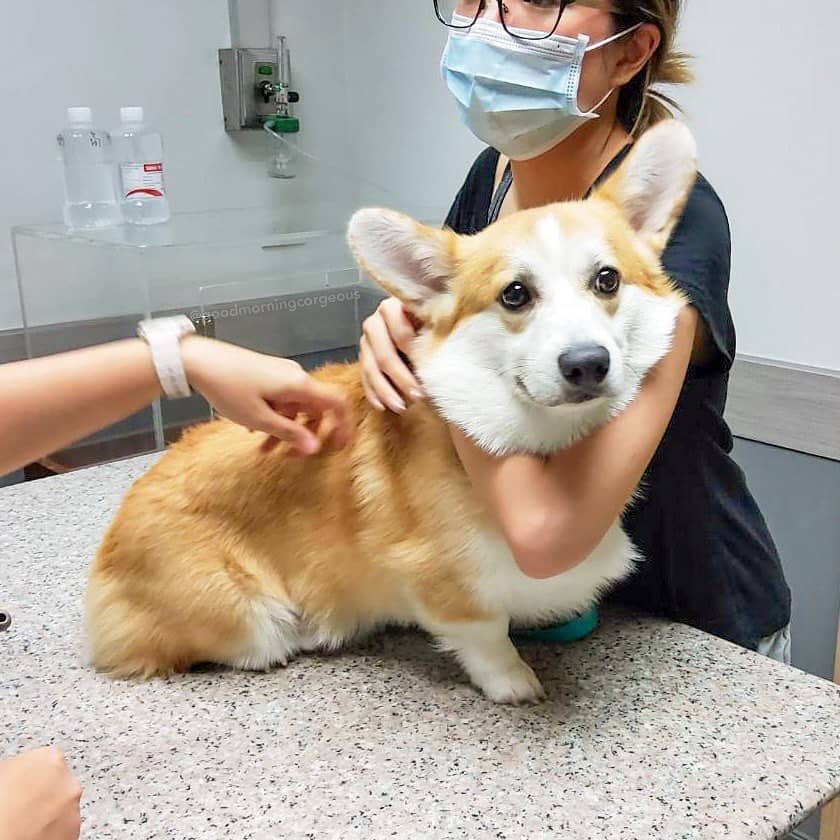
Photo from: @goodmorningcorgeous
When dogs try to master potty training, a certain health problem occurs. It’s the Urinary Tract Infection, or UTI that makes potty training problematic.
A UTI is usually the reason why a dog that started potty training gets frequent accidents. However, UTIs can happen to dogs of all ages. Take your dog to the vet if you suspect one, and he’ll do a urinalysis to find if there’s blood or bacteria in the urine. That’s an indication of a urinary tract infection.
If you catch a UTI early, it can be treated with antibiotics. Unfortunately, if you leave it untreated, the infection may spread to other organs or cause scarring of the bladder tissue.
Physical Deformities That Affect The Potty Training
Birth defects are also a big reason why you have problems potty training your puppy.
Healthy dogs have the ureter taking urine from the kidneys to the bladder where it stays until the puppy goes to pee. However, in some cases, like in dogs suffering from ectopic ureters, one or both ureters must bypass the bladder and connect to another part of the body; usually, the urethra.
To put this simpler, the urine goes straight out of your dog. Most cases experience frequent urine dribbling.
Some dogs are more prone to ectopic ureters, such as:
• Siberian Huskies
• West Highland White Terriers
• Labrador Retrievers
• Collies
• Corgis
• Miniature Poodles
• Fox Terriers
Bladder or Kidney Stones
Sadly, puppies will experience bladder or kidney stones. Kidney problems are, in fact, quite common.
If you suspect your dog is having issues with these vital organs, you can demand an X-ray for a diagnosis.
Stones don’t occur that often, but some dog breeds are more prone to developing them than others.
Since kidney issues can be quite problematic and painful, it would be best to consult your vet and rule out health troubles. Don’t be harsh… your puppy is not giving you a hard time just because. Maybe, just maybe, he’s the one having a hard time.
Do Behavior Problems Affect Potty Training?
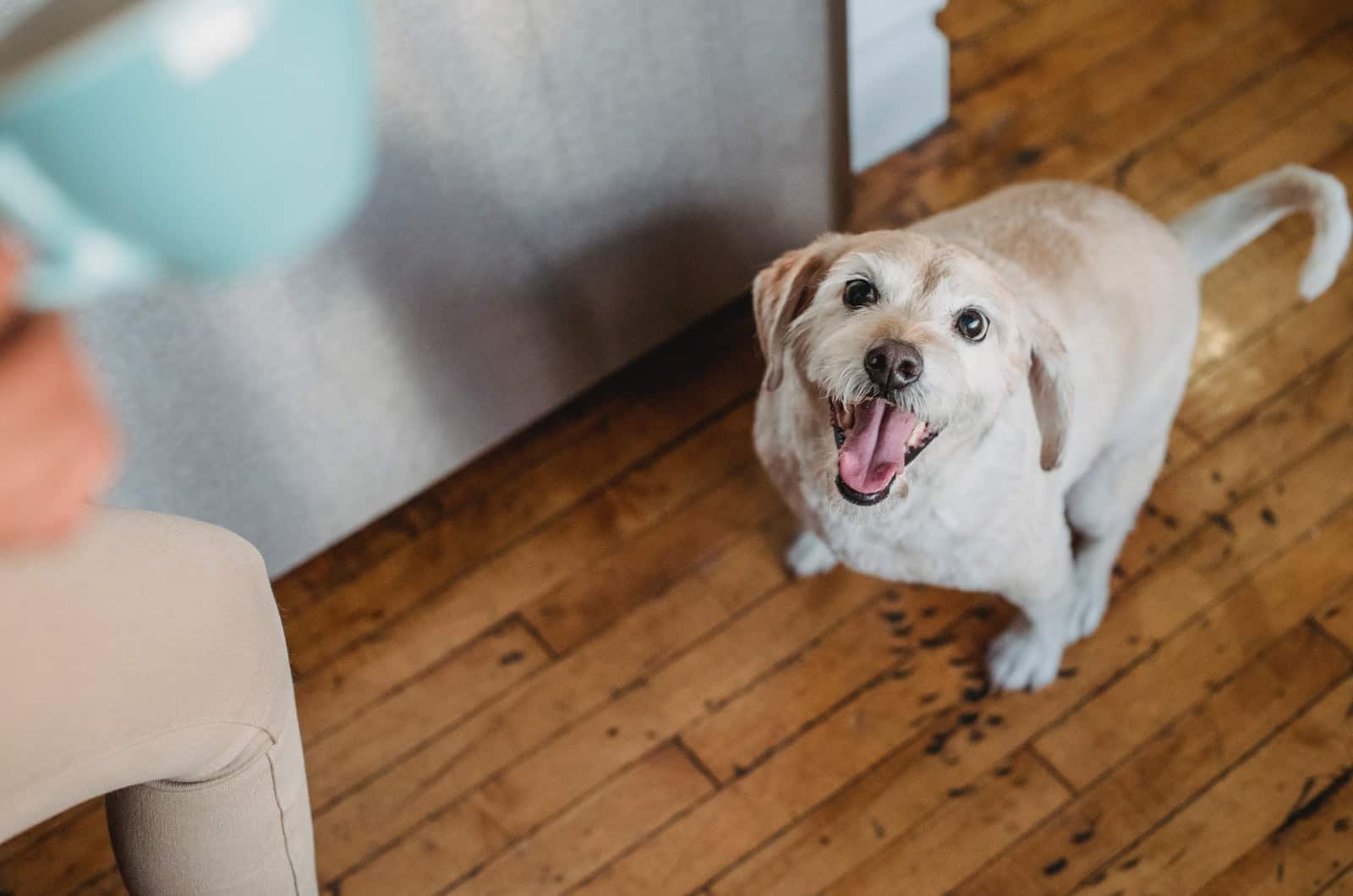
Actually, behavioral problems affect potty training significantly. Luckily, these problems can be passed easily, but they can cause some bumps in the road. In fact, it all depends on the puppy’s history.
If a dog has a poor upbringing, this might be the reason why accidents happen.
By default, dogs demand a clean sleeping area, free from accidents. But, if the breeder raises puppies in a filthy area where the puppies sleep in their own pee or poo, puppies may begin to think that’s normal.
That’s why puppies from pet stores or puppy mills are so hard to potty train. Think about it: they live their entire life in small cages where they eat, sleep, poop, and pee. Puppies from such places will have behavioral issues without any doubt!
If you buy from a responsible breeder, you can expect the puppy litter to take to training early. Young puppies start their training at around 5 to 6 weeks of age.
Such puppies don’t have accidents that often, and they seem to have a well-developed instinct as to when to ask to go to potty.
However, if you tend to be out all day, your new puppy may develop separation anxiety and react with uncontrolled peeing in the house.
That’s something you must avoid. Puppies will attach quickly to you or someone in your household. Don’t let them down.
Can I Speed Up The House-Training Process?
Of course, you can! There are several things you can do to speed up the house-training process. If you follow our guidelines carefully, you may end up with a trained puppy soon.
Clean the area
We bet you didn’t know that proper area cleaning may affect the potty training!
Dogs are creatures with a strong sense of smell. If you don’t clean the area where they pee correctly, they will be able to smell the urine, and thus, become discouraged to go potty there.
Household cleaners, vinegar sprays, and similar products won’t do the trick. You will need something strong like an enzymatic cleaning product that breaks down the urine components.
The thing is, dogs actually smell the ingredients of something, even the components of their urine. When we use house cleaning products, we’re masking the smell for us, but the dogs still smell everything.
Limited access
We get that you want to give your puppy everything, including free access to the entire house, but you shouldn’t do that. Too much freedom and unsupervised time will do harm to your hardwood floors!
Potty training should be done on a consistent schedule. You need to train yourself, too, to catch your puppy trying to make an accident, and take them outside fast.
But, to be able to determine when your puppy might make an accident, you should know the signs:
• sniffing around
• moving in circles
• straight tail
• squatting
When training your puppy, exercise pens, baby gates, fences, kennels, and crates are your best friends. Use them for proper training and a successful result. If your dog masters, i.e., crate training, the crate can help you create a schedule and teach your dog when it’s time to go potty. It also teaches them that the urge to pee in the middle of the night should be controlled.
Also, keeping the dog on a leash can help because you’re keeping the dog close by, and always on your watch.
As your puppy shows signs of improvement, you can gradually allow more freedom in the house.
How Do You Train A 6-Month-Old Dog?
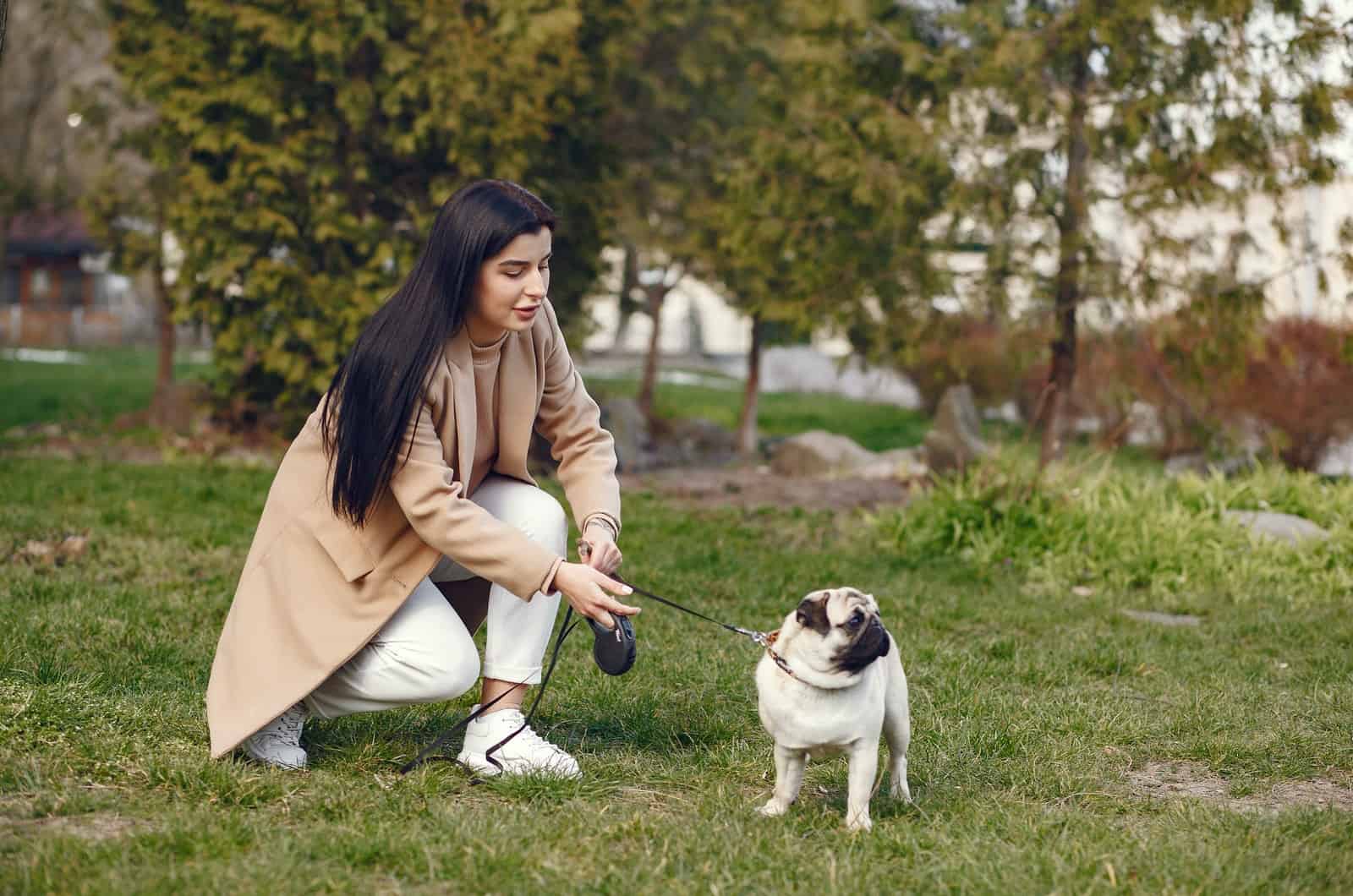
At 6 months old, your puppy’s bladder is still not fully developed. However, it’s expected from a 6-month-old puppy to hold it in for 6 hours.
Still, it’s not too early or too late to start with potty training.
As soon as you notice your puppy running in circles, sniffing one area, or squatting down, you should rush it outside to a specific area and say a trigger word. People usually use “go potty”, “pee”, or “poop”. A puppy’s attention span is short, and they need something simple and direct to learn. Wait until your puppy goes to potty, and praise him a lot once the job is done. Seriously, make a huge fuss about it. He’ll figure out that he has done something amazing, and he will repeat it to get your praise. In case your puppy goes to potty in the wrong place or somewhere in the house, say “no” firmly and ignore him for a bit. He’ll understand that he has done something wrong.
Don’t lose your hopes too soon. It takes months for a puppy to learn how to go to potty in the right place. Some even take up to a year! Every puppy is different, but with lots of positive reinforcement, success is guaranteed.
When Do You Take The Puppy Out?
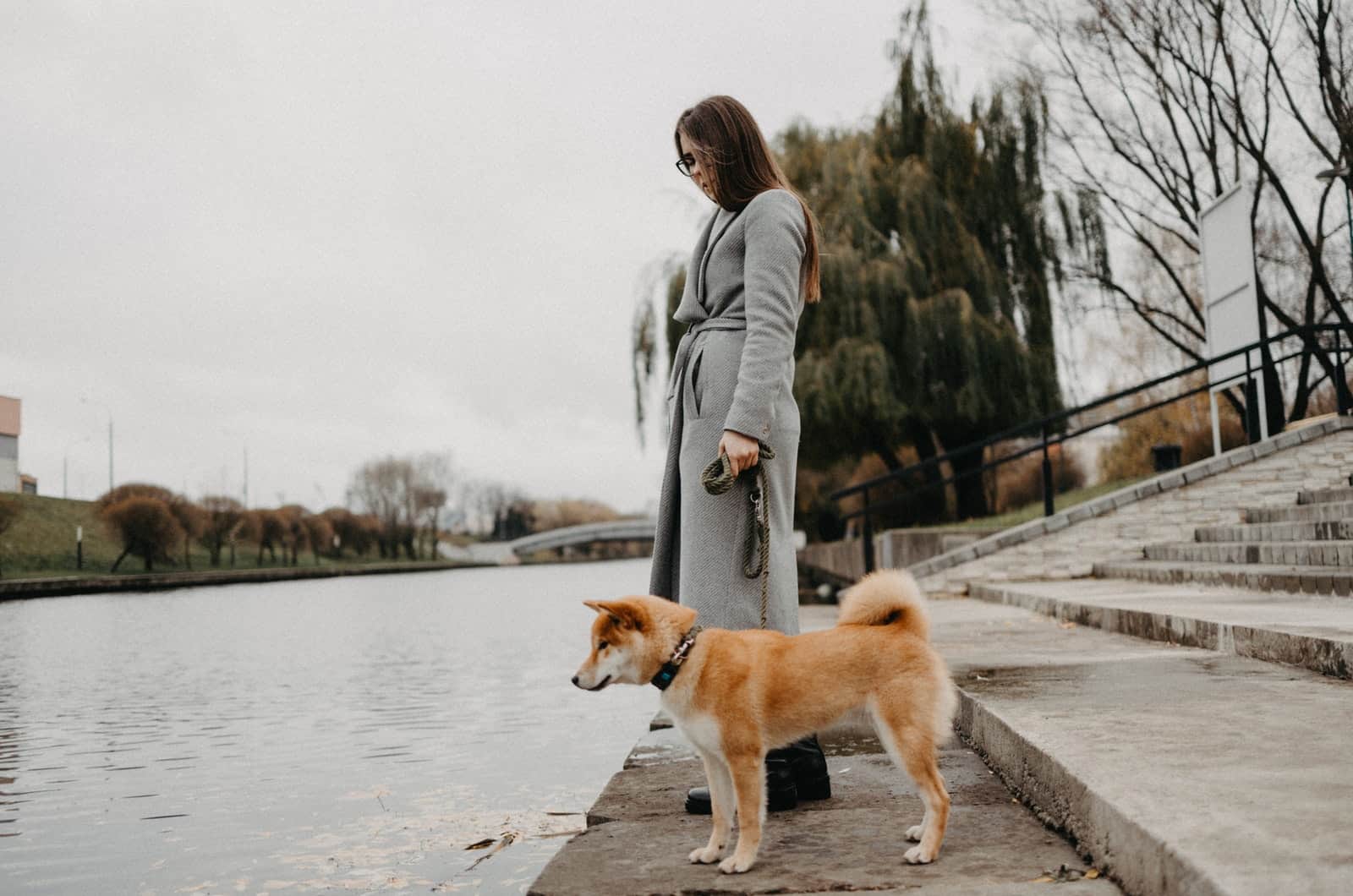
Every puppy should have potty time after:
• They wake up in the morning
• Waking up after a long nap
• After meals (within 30 minutes)
• After playtime
What all dog owners should use when potty training is a trigger phrase. Every time the puppy goes to potty, you should use a key phrase or a trigger word. It should be something simple and direct like “pee”, “poop”, or “go potty”.
Also, you should take your puppy out every hour or so.
There is a general rule that a puppy should be able to hold it in for the number of hours that equals the number of months he’s old. For example, a 6-month-old puppy should be able to hold it for 6 hours.
Still, if you can, take him out every once in a while. It should be done without much fuss, calmly, and without any distraction.
As soon as your puppy goes to potty successfully, you can give him a reward. They love treats, but other praises like playtime also work.
Heads up: most people adopt puppies in the spring and summer precisely because of potty training. It’s much easier to rush outside and find a potty spot in warm weather instead of in the winter.
What you need to remember is not to scold your dog when accidents happen; otherwise, you’ll discourage him.
How To Deal With Accidents
Remember those signs your puppy will make when it’s about to go to potty? Well, as soon as you see your pooch running in circles or starting to squat, you should say “no” by using a firm voice, and run your puppy outside. Find a potty spot and tell him the trigger word.
Sure, this sounds very easy, but in real life, it is not always this easy. Once an accident happens, there’s not much to do but clean the area and let your puppy know you’re not happy with his decision. Punishing or even hitting the puppy is not an option!If you should catch your puppy circling in a spot inside to go to potty, or even starting to squat… say NO in a firm voice. Then, immediately take him outside, and tell him to go potty.
If your puppy somehow escaped your watch and had an accident in the house already, you can bring him over to the mess and say NO in your firm voice. There really isn’t much you can do if you didn’t catch him in the act, but letting him know you are not happy with the pee or poop inside is okay… just don’t hit or punish him.
Tips and Tricks For Getting Dog Pee Out Of Carpet
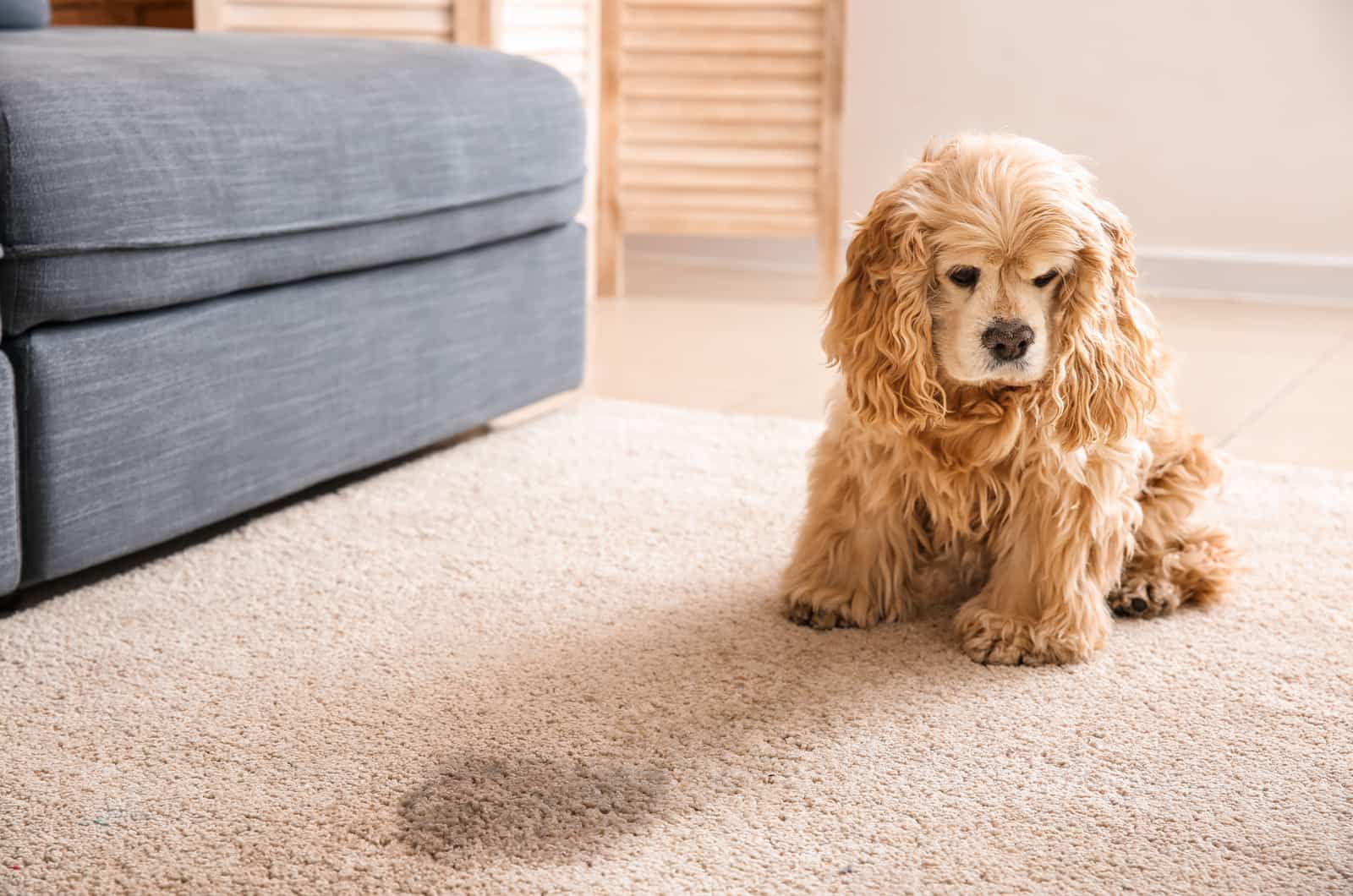
You won’t be able to avoid accidents in your home. It’s only a matter of time when your puppy will pee on your brand new carpet. Hmm, maybe having carpet in your living room while your puppy learns how to go to potty isn’t a good idea?
As we already mentioned, you need to be thorough when removing smell since dogs can sniff it all. Did you know that a dog’s sense of smell is 100,000 times stronger than ours? Yeah, that much!
When removing urine smell, you can use a homemade product or buy an enzyme cleaner. Before using it on a stain, try it on a small area to see if the product will bleach the color.
Fighting dog pee stains with vinegar and water:
• First, soak up the wet area with paper towels or a white rug. It’s important not to scrub the urine into the carpet because you’ll work the urine deeper into the carpet; thus, removing it will be a huge problem. Just tap and blot.
• Then, mix 50% vinegar and 50% water.
• Pour the mixture onto the stain and scrub with a white rug. Vinegar neutralizes the ammonia smell.
• Blot the stain with paper towels. Place some on the stain and step on them with all your weight.
• Sprinkle baking soda on the stain once the carpet is dry.
• Lastly, vacuum the area.
And, here is a natural deodorizer you can make at home:
• 1 tablespoon vinegar
• 1 teaspoon baking soda
• 2 cups of warm water
• 1 spray bottle
Removing stains with a special enzyme cleaner:
• Wipe the stain as much as you can, and soak it with an enzyme cleaner.
• Let the cleaner sit for 10 minutes.
• Blot with a clean rug and dry for 24 hours.
There’s even a trick of using baking soda only. Baking soda absorbs moisture and traps smells. Just sprinkle it onto the stain and work it into the carpet. Let it sit overnight, and vacuum the next day. Repeat the process multiple times if necessary.
No matter if you use natural products or you go on Amazon and order enzyme cleaners, the important thing is to remove the smell before your doggie thinks that’s his new potty area.
Finally…
So, now that you know all these tricks, you won’t say “My dog is 6 months old and not potty trained”. You’ll say: “My dog is 6 months old and is doing great with potty training”.
Good luck with potty training your puppy. We don’t mean to worry you, but you will need lots of luck, patience, and time for successful training. The important thing is to start on time. Teaching older dogs new tricks isn’t easy at all. The more you stall with the training, the more issues you’ll have. Your little German Shepherd may be a smart cookie, but when it comes to potty training, all dogs are the same.
Mastering any training is tough. Do you really think a puppy won’t be afraid to poop outside just because? It’s a big world, and they get scared easily. It’s not that your puppy doesn’t like you. He does (unless you’ve hit him!), but he’s the one that’s more afraid.
Gather all your nerves and start with potty training… yesterday! Sooner or later, your puppy will calm down and learn all the tricks.
Read Next: 8 Week Old Puppy Breathing Fast While Sleeping: 10 Causes
